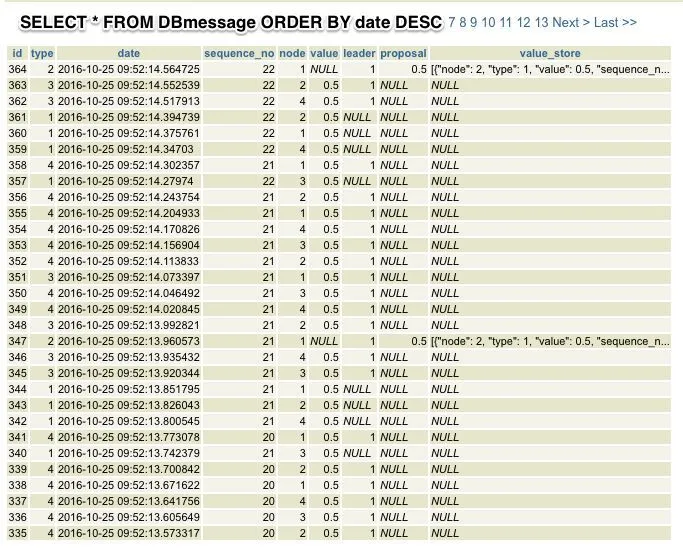 Alexander
Alexander
In my test all works as expected:
from pony.orm import *
class PersonMixin(object):
def hello(self):
print('My name is ' + self.name)
class Person(PersonMixin):
def __init__(self, name):
self.name = name
db = Database('sqlite', ':memory:')
class DBPerson(PersonMixin, db.Entity):
name = Required(str)
sql_debug(True)
db.generate_mapping(create_tables=True)
with db_session:
p1 = Person(name='John')
p1.hello()
p2 = DBPerson(name='Mike')
p2.hello()
with db_session:
p3 = select(p for p in DBPerson).first()
p3.hello()
 Lucky
Lucky
Let me explain my project a bit, maybe that will help understanding my problem.
I have a script (called node) which sends (broadcasts) messages and receives brodcasted messages. Thats basically all it does. Receiving messages and doing a bit of calulation what to send next.
And I am writing another script (called db_proxy) which also reveives the broadcasted messages. This script should decode the stuff from the socket, like the node, but put it in a database.
So I want to use the same code for receiving the Messages.
But in second program i want to dump it into a database, instead of answering with more messages.
The mixin, while perfectly working, is not as readable, because the functionality is split into 2 classes.
I think I will write seperate DBMessage class which has functions to set it's own values according to a given Message instance.
with db_session:
p3 = select(p for p in DBPerson).first()
p = p3.from_db() # eventually calls Person(foo=self.foo, bar=self.bar)
p.foo.do_stuff()
With that I don't have to modify the original classes ( Message or in your example Person)
 Lucky
Lucky
SELECT DISTINCT ON (m.type) * FROM (
SELECT * FROM DBMessage ORDER BY date DESC
) as m ORDER BY m.type, m.date DESC
This selects the newest (m.date) DBMessage of each m.type in postgres.
 Lucky
Lucky

 Alexey
Alexey
Is this what you need? https://docs.ponyorm.com/api_reference.html?highlight=distinct#distinct
 Alexander
Alexander
I think this is not the same thing. As I understand, "DISTINCT ON" is a special PostgreSQL construction which is not equivalent to DISTINCT
 Lucky
Lucky
yeah, DESTINCT and DESTINCT ON ({column}) are different.
https://www.postgresql.org/docs/9.0/static/sql-select.html#SQL-DISTINCT
 Lucky
Lucky
DESTINCT removes duplicate rows, DESTINCT ON keeps only the first row with the same value of a column
 Lucky
Lucky
Actually I did the wrong thing, here is my correct SQL:
SELECT DISTINCT ON (m.node) * FROM (
SELECT * FROM DBmessage WHERE type = 1
) as m ORDER BY m.node, m.date DESC
But lets stay by the above example :D
 Alexander
Alexander
Can you use max id instead of a latest date to find the latest message? I think it will be a bit easier to write
 Lucky
Lucky
Can you use max id instead of a latest date to find the latest message? I think it will be a bit easier to write
hm, probably later the max_id might not be the newest one, if a client is to slow to dump it in real time
 Alexander
Alexander
ok, with dates you can try the following:
select(m for m in DBMessage if (m.type, m.date) in select((m.type, max(m.date)) for m in DBMessage))
But if two messages of the same type may have indentical date (up to microseconds), you will get both messages
 Alexander
Alexander
Another way is to use raw SQL query:
DBMessage.select_by_sql("""
SELECT DISTINCT ON (m.node) * FROM (
SELECT * FROM DBmessage WHERE type = 1
) as m ORDER BY m.node, m.date DESC
""")
 Lucky
Lucky
 Alexander
Alexander
Note that inside raw SQL you can use Python expression, which are converted to query parameters:
message_type = 1
DBMessage.select_by_sql("""
SELECT DISTINCT ON (m.node) * FROM (
SELECT * FROM DBmessage WHERE type = $message_type
) as m ORDER BY m.node, m.date DESC
""")
 Lucky
Lucky
Note that inside raw SQL you can use Python expression, which are converted to query parameters:
message_type = 1
DBMessage.select_by_sql("""
SELECT DISTINCT ON (m.node) * FROM (
SELECT * FROM DBmessage WHERE type = $message_type
) as m ORDER BY m.node, m.date DESC
""")
I already use that, sooo cool :D
 Alexander
Alexander
show is the method of QueryResult. select_by_sql returns list of entities, which don't have show method.
 Lucky
Lucky
How would I do m.date >= NOW() - '1 minute'::INTERVAL?
latest_vote = orm.select(m for m in DBVoteMessage).order_by(orm.desc(DBVoteMessage.date)).first()
 Alexander
Alexander
You can write
from datetime import datetime, timedelta
select(m for m in DBVoteMessage if m.date >= detetime.now() - timedelta(hours=1))
But Pony will think that expression datetime.now() - timedelta(hours=1) can be evaluated in Python and replaced with a single query parameter.
In order to use server NOW() you can use raw SQL fragment:
select(m for m in DBVoteMessage if m.date >= raw_sql("NOW() - '1 minute'::INTERVAL"))
 Lucky
Lucky
You can write
from datetime import datetime, timedelta
select(m for m in DBVoteMessage if m.date >= detetime.now() - timedelta(hours=1))
But Pony will think that expression datetime.now() - timedelta(hours=1) can be evaluated in Python and replaced with a single query parameter.
In order to use server NOW() you can use raw SQL fragment:
select(m for m in DBVoteMessage if m.date >= raw_sql("NOW() - '1 minute'::INTERVAL"))
timedelta lacks documentation. Only is listed as a possible type, but not how to use it.
 Alexey
Alexey
Hey guys I have a problem with the display of the ORM online editor.
I found no good place to file an issue, so I went for the doc repo:
https://github.com/ponyorm/pony-doc/issues/1
Thank you for reporting, it should be fixed now.
Please use the issue tracker in this project https://github.com/ponyorm/editor for any issues related to the Editor.
 stsouko
stsouko
from enum import Enum
from pony.orm.dbapiprovider import IntConverter
class EnumConverter(IntConverter):
def validate(self, val):
if not isinstance(val, Enum):
raise ValueError('Must be an Enum. Got {}'.format(type(val)))
return val
def py2sql(self, val):
return val.value
def sql2py(self, val):
return self.py_type(val)
db.provider.converter_classes.append((Enum, EnumConverter))
class Models(db.Entity):
id = PrimaryKey(int, auto=True)
model_type = Required(ModelType, default=ModelType.PREPARING)
class ModelType(Enum):
PREPARER = 0
 stsouko
stsouko
`class EnumConverter(IntConverter):
def validate(self, val):
if not isinstance(val, Enum):
raise ValueError('Must be an Enum. Got {}'.format(type(val)))
return val
def py2sql(self, val):
return val.value
def sql2py(self, val):
return self.py_type(val)
db.provider.converter_classes.append((Enum, EnumConverter))`
 stsouko
stsouko
`
class EnumConverter(IntConverter):
def validate(self, val):
if not isinstance(val, Enum):
raise ValueError('Must be an Enum. Got {}'.format(type(val)))
return val
def py2sql(self, val):
return val.value
def sql2py(self, val):
return self.py_type(val)
db.provider.converter_classes.append((Enum, EnumConverter))
`
 Alexander
Alexander
Multiline examples are wrapped with three backquotes. What error do you get when using select?
 stsouko
stsouko
I tryed this and got TypeError: Expression ModelType.PREPARER has unsupported type 'ModelType'
 stsouko
stsouko
если можно на русском, то: я предположил что маппер автоматом раскрывает Енам в число и выполняет запрос. вот и решил сделать так.
 Alexander
Alexander
We plan to add support of enums, I think it is a bit more complex than in your example. Right now the simplest you can do is to manualy convert enum items to values inside query:
select(x.id for x in Models if x.model_type == ModelType.PREPARER.value)





 HM
HM

 Rozen
Rozen